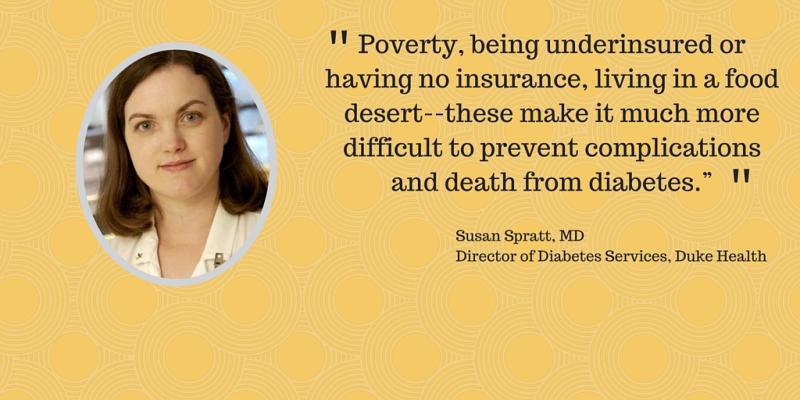
In a recent interview with the Duke Translational Medicine Institute, Susan Spratt, MD, assistant professor of medicine (Endocrinology, Metabolism and Nutrition) and assistant professor of community and family medicine, discusses her passion for caring for patients with diabetes, her work with the Durham Diabetes Coalition.
Read an excerpt of the interview below and visit the DTMI website for the full article.
As a physician/professor at Duke, how do you spend your days?
I am an endocrinologist and the Director of Diabetes Service for Duke Health. That means I spend about 25 percent of my time seeing patients in the Duke clinics, which includes spending time supervising medical students and fellows, and another 20 percent of my time serving as the Director of Diabetes. Then I also spend about 20 percent of my time working in the community with the Durham Diabetes Coalition. On top of that I am currently heavily involved in the EPIC/MaestroCare project, and spend about 45 percent of my time on that. If those numbers don’t add up to 100 percent, that’s probably an accurate picture!
How did you get involved with the Durham Diabetes Coalition?
Rob Califf, Michelle Lyn, and Fred Johnson were the ones who got me involved. Community and Family Medicine had created a group that met every two weeks to discuss how we could partner for better diabetes care. We did small pilots to look at things such as whether co-pays improve attendance at clinics, and whether electronic consults work. Then we had the opportunity with Rob Califf to apply for a grant funded by Bristol Myer Squibb, and we put together a proposal to use geospatial data to help us identify particular patients and neighborhoods at high risk for diabetes complications for interventions. That turned into the Durham Diabetes Coalition. The mission of the DDC was to translate known medical solutions into real world pathways.
What does the Durham Diabetes Coalition do?
The Durham Diabetes Coalition and the Southeastern Diabetes Initiative is a project whose mission is to reduce death and disability from diabetes. We use geospatial and secondary medical data analysis to identify patients and neighborhoods at high risk for costly complications. We offered patients at highest risk home visits with a nurse practitioner, social worker, and dietician. Those at medium or lower risk, we offered telephone coaching and awareness of community events. We partner with community efforts to increase awareness of the prevention and management of type 2 diabetes.
What is the best part of working with the Durham Diabetes Coalition?
I am particularly proud of our work with CAARE and the food pantry that we started with them. We were seeing huge amounts of food insecurity in Durham. A patient would show us her kitchen and there would be no food in the house, or there would be cupcakes or some other food that was not appropriate because that was what was at hand at the local food pantry. We worked with CAARE to set up a food pantry that offers only healthy food – low sodium, low sugar canned goods, vegetables, etc. When we started, it was only serving about 5 families. Now it serves over 30.
The food pantry complements the support groups and the consults, where we can sit down with patients and look at their log book to see how their blood sugar levels are doing and find out what challenges they are facing with their diabetes.
What is the most challenging part of working with the Durham Diabetes Initiative?
Poverty. We live in a society that does not treat everyone equally. We have lifesaving tools and medicines to manage diabetes, but I can’t affect change if my patients can’t afford those medications. We are looking now at how we might change government policies that will allow us to improve access to medications for those who can’t afford them.
Learn more
Q&A with Susan Spratt: Advocate for patients with high-risk diabetes